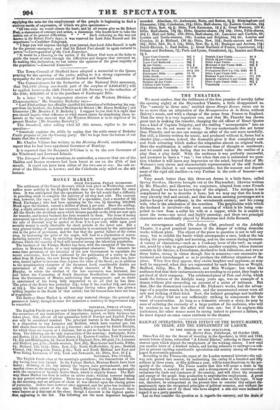THE THEATRES.
We must confess, that the fulfilment of the first promise of novelty (after the opening night) at the Haymarket Theatre a little disappointed us. The "comedy in three acts," entitled Queen Mary's Bower' turns out to be no more than an adaptation of the Mousguetaires de laReine without Halevy's music, and with a change of the scene from France to England. That the story is a very ingenious one, and that Mr. Planche has shown great tact in making the transfer, changing the old officer of Henri Quatre into a kind of Captain Dalgetty, and the rattling " mousquetaire " into an Irishman, we do not mean to deny. No one understands this art better than Planche, and no one can manage an affair of the sort more tastefully. But still, a libretto written for music, and produced without it, forms but a slender play,—unless, indeed, the dramatist gives it that completely new and fresh colouring which makes the adaptation almost an original work. Here the modification is rather of costume than of thought or sentiment; and we could not help feeling that we witnessed rather the outline of a play than a play itself. With the audience it was perfectly successful, and promises to have a " run "; but when that run is exhausted we ques- tion whether it will leave any impression on the mind, beyond that of Mr. Webster's very clever and characteristio representation of the stiff Scotch officer. His dialect is not unexceptionable; but the manner and deport- ment of the rigid old duellist—a very Puritan in the code of honour—are perfect. Very much better than this three-act drama is a little farce, called Spring Gardens, likewise brought out at the Haymarket; likewise written by Mr. Planche; and likewise, we conjecture, adapted from some French piece, though we have no knowledge of the original. The intrigue is too complicated for us to describe it here; but we may say that the knot hi very cleverly tied and untied; and that the most amusing personages are a jealous keeper of an ordinary, in the seventeenth century, and his young wife, who is the admiration of the courtiers. The perplexities with which the husband is involved—the most amusing of which is his being com- pelled to view from a cellar his wife at a supper, while he is unable to enter the room—are novel and highly amusing; and these two principal characters are excellently played by Buckstone and Julia Bennett.


























 Previous page
Previous page